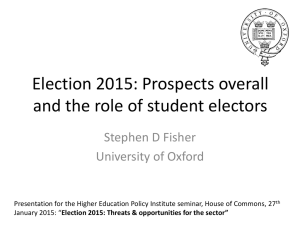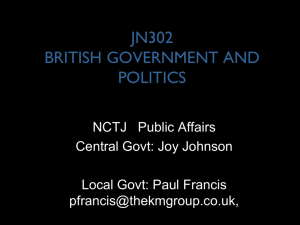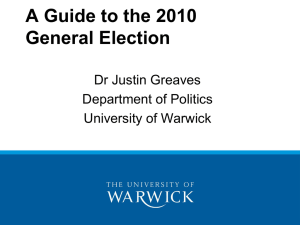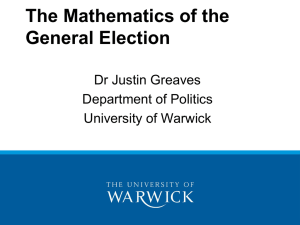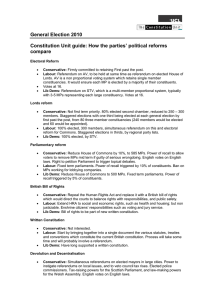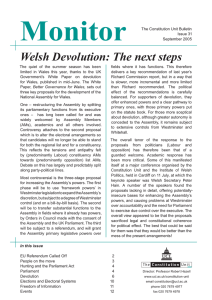MONITOR SCOTTISH AND WELSH ELECTIONS 2007: TOWARDS A NEW DEVOLUTION SETTLEMENT?
advertisement
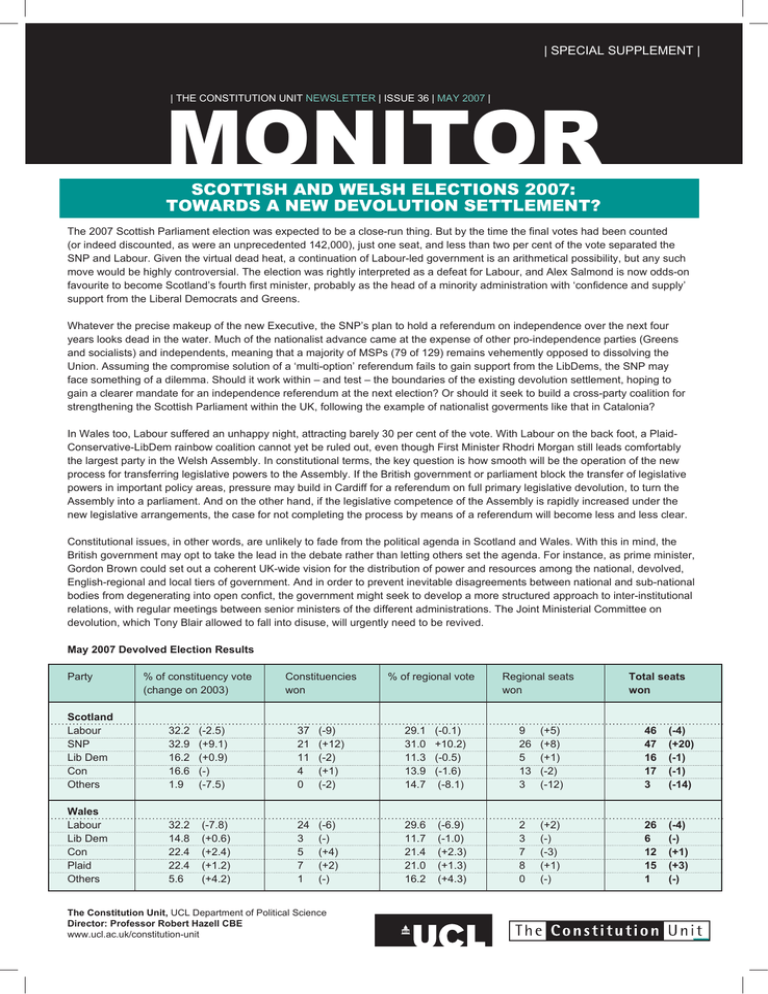
| SPECIAL SUPPLEMENT | | THE CONSTITUTION UNIT NEWSLETTER | ISSUE 36 | MAY 2007 | MONITOR SCOTTISH AND WELSH ELECTIONS 2007: TOWARDS A NEW DEVOLUTION SETTLEMENT? The 2007 Scottish Parliament election was expected to be a close-run thing. But by the time the final votes had been counted (or indeed discounted, as were an unprecedented 142,000), just one seat, and less than two per cent of the vote separated the SNP and Labour. Given the virtual dead heat, a continuation of Labour-led government is an arithmetical possibility, but any such move would be highly controversial. The election was rightly interpreted as a defeat for Labour, and Alex Salmond is now odds-on favourite to become Scotland’s fourth first minister, probably as the head of a minority administration with ‘confidence and supply’ support from the Liberal Democrats and Greens. Whatever the precise makeup of the new Executive, the SNP’s plan to hold a referendum on independence over the next four years looks dead in the water. Much of the nationalist advance came at the expense of other pro-independence parties (Greens and socialists) and independents, meaning that a majority of MSPs (79 of 129) remains vehemently opposed to dissolving the Union. Assuming the compromise solution of a ‘multi-option’ referendum fails to gain support from the LibDems, the SNP may face something of a dilemma. Should it work within – and test – the boundaries of the existing devolution settlement, hoping to gain a clearer mandate for an independence referendum at the next election? Or should it seek to build a cross-party coalition for strengthening the Scottish Parliament within the UK, following the example of nationalist goverments like that in Catalonia? In Wales too, Labour suffered an unhappy night, attracting barely 30 per cent of the vote. With Labour on the back foot, a PlaidConservative-LibDem rainbow coalition cannot yet be ruled out, even though First Minister Rhodri Morgan still leads comfortably the largest party in the Welsh Assembly. In constitutional terms, the key question is how smooth will be the operation of the new process for transferring legislative powers to the Assembly. If the British government or parliament block the transfer of legislative powers in important policy areas, pressure may build in Cardiff for a referendum on full primary legislative devolution, to turn the Assembly into a parliament. And on the other hand, if the legislative competence of the Assembly is rapidly increased under the new legislative arrangements, the case for not completing the process by means of a referendum will become less and less clear. Constitutional issues, in other words, are unlikely to fade from the political agenda in Scotland and Wales. With this in mind, the British government may opt to take the lead in the debate rather than letting others set the agenda. For instance, as prime minister, Gordon Brown could set out a coherent UK-wide vision for the distribution of power and resources among the national, devolved, English-regional and local tiers of government. And in order to prevent inevitable disagreements between national and sub-national bodies from degenerating into open confict, the government might seek to develop a more structured approach to inter-institutional relations, with regular meetings between senior ministers of the different administrations. The Joint Ministerial Committee on devolution, which Tony Blair allowed to fall into disuse, will urgently need to be revived. May 2007 Devolved Election Results Party % of constituency vote (change on 2003) Constituencies % of regional vote won Scotland Labour 32.2 (-2.5) 37 SNP 32.9 (+9.1) 21 Lib Dem 16.2 (+0.9) 11 Con 16.6 (-) 4 Others 1.9 (-7.5) 0 Wales Labour 32.2 (-7.8) 24 Lib Dem 14.8 (+0.6) 3 Con 22.4 (+2.4) 5 Plaid 22.4 (+1.2) 7 Others 5.6 (+4.2) 1 Regional seats won Total seats won (-9) 29.1 (+12) 31.0 (-2) 11.3 (+1) 13.9 (-2) 14.7 (-0.1) +10.2) (-0.5) (-1.6) (-8.1) 9 26 5 13 3 (+5) (+8) (+1) (-2) (-12) 46 47 16 17 3 (-4) (+20) (-1) (-1) (-14) (-6) 29.6 (-) 11.7 (+4) 21.4 (+2) 21.0 (-) 16.2 (-6.9) (-1.0) (+2.3) (+1.3) (+4.3) 2 3 7 8 0 (+2) (-) (-3) (+1) (-) 26 6 12 15 1 (-4) (-) (+1) (+3) (-) The Constitution Unit, UCL Department of Political Science Director: Professor Robert Hazell CBE www.ucl.ac.uk/constitution-unit


